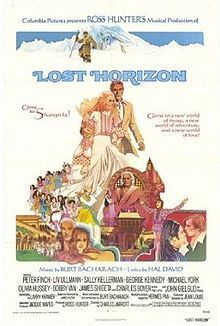Lisa Napoli's Blog, page 70
March 4, 2011
Refugee camps consolidating
…from seven to two, given the repatriation of the refugees, most notably to the US:
Excerpt:
"Currently there are 69,203 refugees in seven camps: Beldangi I, Beldangi II, Beldangi II extension, Khudunarabari, Timai and Goldhap (all in Jhapa District); and Sanischare (Morang District).
Of the camps' current population, about 75 percent have expressed an interest in third-country resettlement.
UNHCR is currently in negotiations with the government on the planning process in an effort to ensure that the same level of services and assistance are maintained for the refugees when the camps are reduced to two."








Salt Lake City
Reposting from Powell's: The Dark Sides of Shangri-La
Posted by Lisa Napoli, March 3, 2011 3:58 pm
No Comments Filed under: .
 There's a lot of irony in the title of my book, Radio Shangri-La: What I Learned in Bhutan, the Happiest Kingdom on Earth, which of course doesn't get conveyed if you take it at face value or haven't read it. Bhutan, of course, isn't Shangri-La (whatever that is), nor is it the happiest place on earth. (My boyfriend says that's Costco, but I believe that Disney lays claim to the actual trademark on the phrase.) It's a complicated, dimensional, ever-changing place that happens to offer pristine natural beauty. But it's in no way perfect.
There's a lot of irony in the title of my book, Radio Shangri-La: What I Learned in Bhutan, the Happiest Kingdom on Earth, which of course doesn't get conveyed if you take it at face value or haven't read it. Bhutan, of course, isn't Shangri-La (whatever that is), nor is it the happiest place on earth. (My boyfriend says that's Costco, but I believe that Disney lays claim to the actual trademark on the phrase.) It's a complicated, dimensional, ever-changing place that happens to offer pristine natural beauty. But it's in no way perfect.
Anyway, because of the title, I invariably get two types of questions: People who want to unlock the mystery of how they can be happier like the Bhutanese…and people who lambaste me for what they assume is an unfairly rosy picture of Bhutan, given the largely unreported story of the Bhutanese refugees who have languished for 20 years in camps along the border of Nepal, unclaimed by either country, and are just now being resettled around the globe.
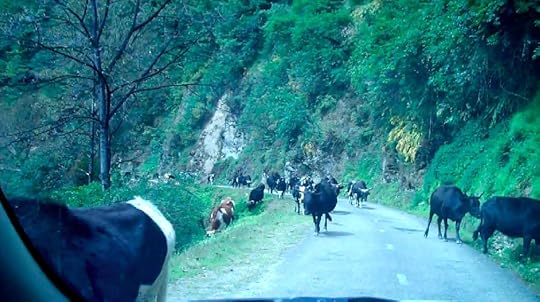
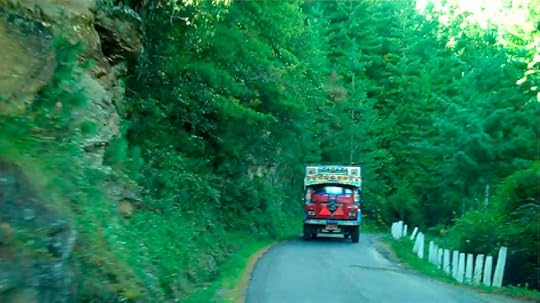
A stretch of the Bhutan National Highway somewhere in the Bumthang district. Built and maintained by Indian laborers, many of whom died in the creation of the road when it was first built forty years ago, this highway traverses the entire nation.
Neither of those questions come from people who have read my book. Radio Shangri-La is partially about another largely unreported dark side of Bhutan — the perilous effects of modernization, globalization, and the media, as well as the fact that (as is the case in many other developing countries) many young people are willing to do whatever they can to get their feet on US soil, for they feel in doing so they will get rich, even if it is at the expense of their family life or cultural values. (The difference with Bhutan is that this phenomenon is relatively new — in part because Bhutan was secluded for so long, and because TV only came in ten years ago, unleashing for Bhutanese the sense of lack that TV and commercialism are designed to create.)
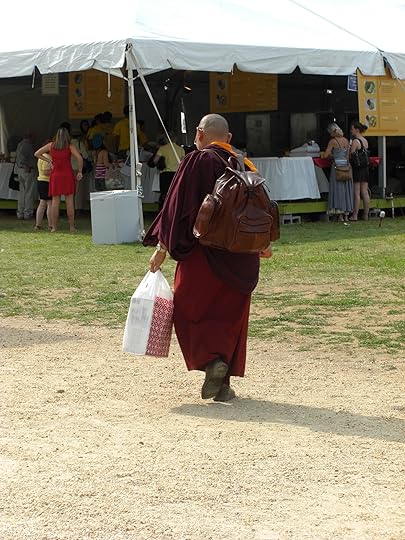
A monk visiting the US for the Smithsonian FolkLife Festival in DC in the summer of 2008, which featured life in Bhutan. One of the favorite past-times of the visiting Bhutanese delegation was shopping.
I didn't focus on the refugee situation in Bhutan, not because I find the situation uninteresting or unimportant or because I wanted to ignore it — it just wasn't the subject most relevant to my experiences there. Nor, was it a subject I was best-equipped to address. I make a point of mentioning it whenever I can, particularly when I speak to groups about it, because intolerance for outsiders is discordant with the Buddhist beliefs that underlie Bhutanese culture. And because the refugee problem in Bhutan is super relevant and evocative of other situations unfolding around the world, as borders erase and people migrate.
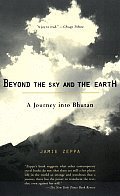 For the record: Some accuse Bhutan of ethnic cleansing by forcing out the Nepalese who were brought in to help build roads and infrastructure as Bhutan was beginning to develop forty years ago, claiming that people who weren't "purely Bhutanese" weren't welcome to stay. The official Bhutanese response is that their system of free health care and schooling couldn't handle the extra citizenry, and that the Nepalese weren't forced out. There's an excellent web documentary about the subject if you want to find out more about it: Bhutanese Refugees: The Story of a Forgotten People. Perhaps you live in a community where the refugees have been resettled; many local papers have been chronicling their integration into their new worlds. I also highly recommend Jamie Zeppa's beautiful book (Beyond the Sky and the Earth: A Journey Into Bhutan) from 1989 about her time as a teacher in Bhutan during the beginnings of the refugee crisis. She addresses it too; she saw it as it happened. Like me, she feels great love for the people there, while being confused at the situation unfolding around her.
For the record: Some accuse Bhutan of ethnic cleansing by forcing out the Nepalese who were brought in to help build roads and infrastructure as Bhutan was beginning to develop forty years ago, claiming that people who weren't "purely Bhutanese" weren't welcome to stay. The official Bhutanese response is that their system of free health care and schooling couldn't handle the extra citizenry, and that the Nepalese weren't forced out. There's an excellent web documentary about the subject if you want to find out more about it: Bhutanese Refugees: The Story of a Forgotten People. Perhaps you live in a community where the refugees have been resettled; many local papers have been chronicling their integration into their new worlds. I also highly recommend Jamie Zeppa's beautiful book (Beyond the Sky and the Earth: A Journey Into Bhutan) from 1989 about her time as a teacher in Bhutan during the beginnings of the refugee crisis. She addresses it too; she saw it as it happened. Like me, she feels great love for the people there, while being confused at the situation unfolding around her.
Like Jamie Zeppa, I fell in love with the people of Bhutan, not the country's policies or politics; and, like her, I was privileged to spend time there (from a completely different perspective, at a completely different moment in time), and was moved to share those stories and observations, and have tried to articulate how the experience of living in a world not my own changed me.








March 3, 2011
Adrie Kusserow's poem about Bhutan in The Sun
Beneath The Sky, The Longing
Adrie Kusserow
– For Lama Shenphen
Bhutan, 2010
At the top of the Thimphu hills the sun leaves its afterbirth everywhere,
prayer flags drench the pines,
a monk scampers away like a red fox,
couples park their cars,
condom wrappers lodge themselves doggedly in the mud,
asserting their rightful place in the path to enlightenment.
Dingy Indian buses, painted gaudy as prostitutes,
careen along the battered road to the capital,
taking villagers to Thimphu, where lust for the West huddles like fog.
Packs of roaming boys with spiked hair and leather jackets
scour the streets for drugs, eye the Westerners hungrily —
boys who failed their exams, left their farms
to sit hung over at the dingy youth center, unemployed,
black eyes nibbling feverishly at the manic commercials
flashing from TVs;
they confess their uselessness to the Welsh monk
who has made it his life's work to help these boys,
to bring them back into the fold.
Meanwhile, tucked above the cobbled streets
in the smoky Thimphu disco,
CNN shouts from its perch above the bar,
and schools of ghostly expats sway,
waving their drunken limbs,
lightheaded from this geography of bliss.
Alone, some lay their bodies down on stiff hotel beds
and all night try to let it go, let it go,
and still they come back to this density of longing,
hard kernel of desire on which the bulky psyche chips its tooth
and winces again,
then stumbles back to the dharma.
Outside the window barking dogs mince the night till it bleeds,
and the Bhutanese boy, high on glue,
wails a kind of love song
deep in the alley below.








The Dark Sides of Shangri-La
Beneath the sky, the longing by Adrie Kusserow
My friend Adrie Kusserow, who led a group of her students at St. Michael's College on a trip to Bhutan this winter to talk about media literacy in the Kingdom, is also a poet. This poem was just published in The Sun and was inspired by her visit. Warning to those who love and venerate Bhutan: It does not paint a happy picture of the Kingdom….
Beneath The Sky, The Longing
Adrie Kusserow








Bad stuff
Amina Elahi from Divanee.com interviewed me to go alongside her review; I like that she asked me about the darker side of my personal story, because I think it's important to share.
http://divanee.com/2011/03/03/eight-questions-with-lisa-napoli-author-of-radio-shangri-la/








Lost Horizon and Shangri-La
Sometimes I get a reminder that I'm living in Hollywood's Los Angeles, instead of the wonderfully detached-from-tha- world-LA in which I happily dwell.
Last night a well-heeled friend kindly threw a small gathering at his home to allow me to introduce RSL to more people, in particular, his book group. Very generous. One of the guests and members of the group: the actor Michael York, who reminded me (sheepishly) that he appeared in the 1973 film….Lost Horizon, a musical remake of the 1937 Frank Capra film which was an adaption of the 1933 James Hilton book of that title. Lost Horizon is supposed to be about the mythic "last Shangri-La," which is at the very least in the Himalayas and may just quite be Bhutan.
The all-knowing Wikipedia explains that the film "tells the story of a group of travellers whose airplane is hijacked while fleeing a bloody revolution. The airplane crash lands in an unexplored area of the Himalayas, where the party is rescued and taken to the lamasery of Shangri-La. Miraculously, Shangri-La, sheltered by mountains on all sides, is a temperate paradise amid the land of snows. Perfect health is the norm, and inhabitants live to very old age while maintaining a youthful appearance."
This is definitely not Bhutan!  And while I've read the book, I've not seen this film. Now I will. Boy was it fun to have Mr. York explain that it was shot….in Burbank.
And while I've read the book, I've not seen this film. Now I will. Boy was it fun to have Mr. York explain that it was shot….in Burbank.








March 2, 2011
Divanee–South Asian news and entertainment
Win a free copy of RSL and read this very nice review while you're at it…in Divanee, a news and entertainment site whose name means "passionate" and 'crazy.' (You always knew those two things were the same, didn't you?)
http://divanee.com/2011/03/02/february-book-of-the-month-radio-shangri-la-by-lisa-napoli/


























